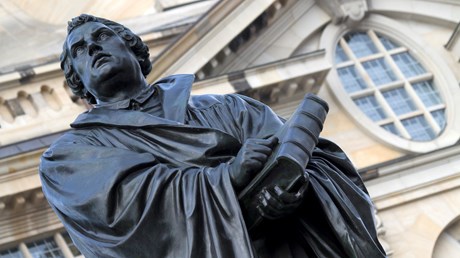Both traditions can appreciate Luther’s famous dictum as a recovery, not a discovery.

Five hundred years ago, Martin Luther, an Augustinian monk, famously broke with the Roman Catholic Church, primarily over the doctrine of justification. Luther insisted salvation came through sola fide (faith alone), but Catholic leadership disagreed and excommunicated Luther for his views. So, it certainly would have surprised Luther to hear that his name would be mentioned with approval at St. Peter’s Basilica in the Vatican on Good Friday in 2016. On this day, sacred to all Christians, Fr. Raniero Cantalamessa, preacher to the papal household, gave the Good Friday sermon to an audience that included the pope, cardinals, bishops, and thousands of the Catholic faithful. He said,
There is a danger that people can hear about the righteousness of God but not understand its meaning, so instead of being encouraged, they are frightened. Saint Augustine had already clearly explained its meaning centuries ago: “The ‘righteousness of God’ is that by which we are made righteous, just as ‘the salvation of God’ [see Ps 3:8] means the salvation by which he saves us.”… Luther deserves the credit for bringing this truth back when its meaning had been lost over the centuries, at least in Christian preaching, and it is this above all for which Christianity is indebted to the Reformation, whose fifth centenary occurs next year. [Emphasis mine] The reformer later wrote that when he discovered this, “I felt that I was altogether born again and had entered paradise itself through open gates.”
Fr. Cantalamessa went on to quote immediately from Paul: “When the goodness and loving kindness of God our Savior appeared, he saved us, not because of deeds done by us in righteousness, …
Source: Christianity Today Most Read